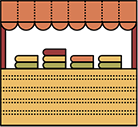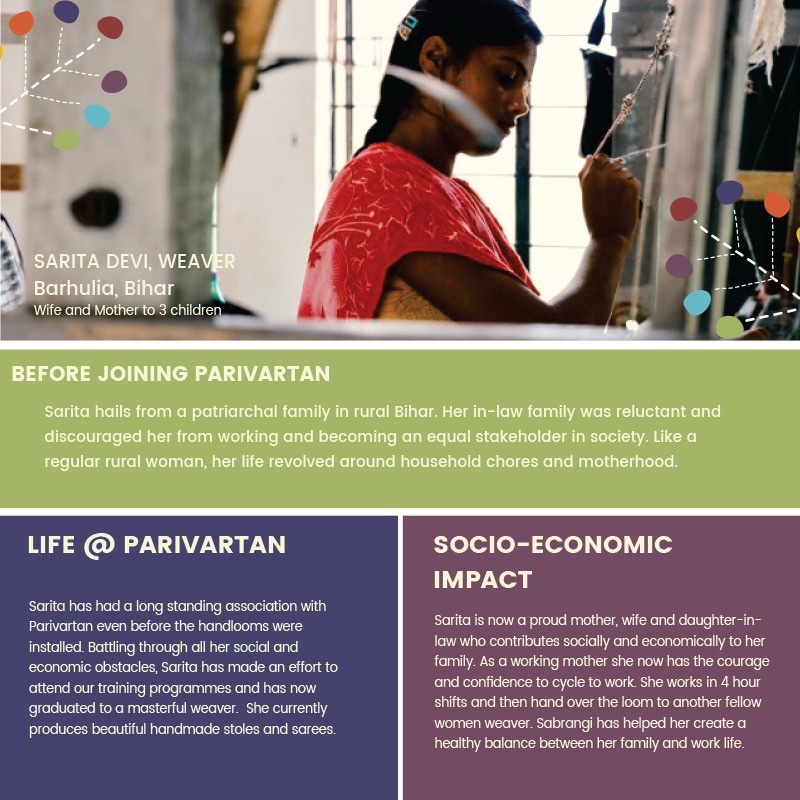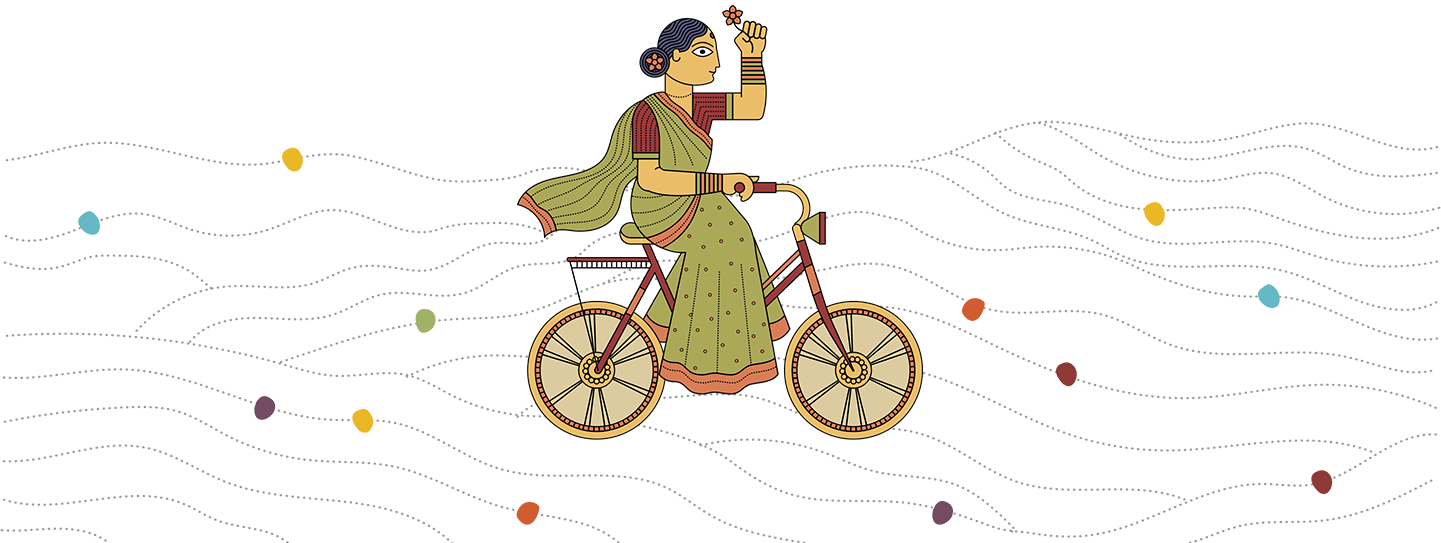BEGINNINGS
The Colours
of Bihar
The origin of Sabrangi is rooted in the idea of providing viable market opportunities to women artisans working at Parivartan (an Integrated Rural Development Initiative based in Siwan district of Bihar).
The heart to our inspiration is to bring about a socio-economic and ethical paradigm shift in the lives of our rural artisans. At Sabrangi, it has been our sustained effort to revive traditional art and thereby transform livelihoods in an enabling and participatory environment. We are now home to several women artisans creating success stories in their everyday lives.
Our Approach
Community Engagement & Participation
- We work from the ground-up to connect and engage with artisan communities to better understand their needs
- We foster partnerships with local NGOs, district and block officials to adapt to the complex dynamics of rural development
- We organise capacity building programmes to encourage rural participation and skill development
- Our work is driven by inclusive research on traditional art forms, sustainable fashion, circular economy and rural development
- The Sabrangi community strongly acknowledges and respects every artisan, material component, and effort that goes into every one of our products
Enabling & Nurturing Work Environment
- Our holistic approach is centric to the well-being and betterment of our artisan community
- The artisans work in a comfortable work-life time balance with 4-5 hour shifts leaving time for daily household chores
- We have also initiated steps to facilitate access to educational programmes, financial aid, health camps and government aid schemes
- Social recognition, community acceptance and overall personality development of our weavers is paramount to our effort
- Our artisans are a wholesome part of community events and festive celebrations conducted at Sabrangi
Socially Responsible & Sustainable Design
- We aim to create an integrated approach which starts with farming organic cotton and ends in hand produced fabric
- It’s been our sustained effort to create an affordable market positioning for handcrafted products
- Our designers play the role of a catalyst, using participatory approaches to train our artisans
- We are working towards a more sustainable way of production by reducing waste and using more eco-friendly methods (natural dyes, natural fibres and manual processes)
- Our team is also striving to revive distinct weaves, patterns and designs that have been forgotten. Products from Sabrangi emanate from the regional culture rather than recent trends
Working with a difference
Collaboration
We partner with local NGOs, government bodies and artisans to help bridge the complex dynamics of rural development
Skill Development
We organise capacity building programmes to train artisans and encourage skill development
Design Engagement
Our designers play the role of a catalyst, using participatory approaches to train our artisans
Socio-Cultural and Economic Development
We take steps to facilitate access to educational programmes, financial aid, health camps and government aid schemes.

Sabrangi collaborates with NGOs to understand the social strata, culture, and requirements of the artisan community and mobilises them accordingly

Happy Customers
Our products are designed locally, affordable, natural, built to last, socially responsible and sustainable

Happy Artisans
Women artisans are nurtured, trained, enabled and promoted to find their respectful place in society
Working with a difference


Collaboration
We partner with local NGOs, government bodies and artisans to help bridge the complex dynamics of rural development
Skill Development
We organise capacity building programmes to train artisans and encourage skill development
Design Engagement
Our designers play the role of a catalyst, using participatory approaches to train our artisans
Socio-Cultural and Economic Development
We take steps to facilitate access to educational programmes, financial aid, health camps and government aid schemes.

Sabrangi collaborates with NGOs to understand the social strata, culture, and requirements of the artisan community and mobilises them accordingly

Happy Customers
Our products are designed locally, affordable, natural, built to last, socially responsible and sustainable

Happy Artisans
Women artisans are nurtured, trained, enabled and promoted to find their respectful place in society
Collaboration
We partner with local NGOs, government bodies and artisans to help bridge the complex dynamics of rural development
Skill Development
We organise capacity building programmes to train artisans and encourage skill development
Design
Engagement
Our designers play the role of a catalyst, using participatory approaches to train our artisans
Socio-Cultural and Economic Development
We take steps to facilitate access to educational programmes, financial aid, health camps and government aid schemes.


Sabrangi collaborates with NGOs to understand the social strata, culture, and requirements of the artisan community and mobilises them accordingly


Happy Customers
Our products are designed locally, affordable, natural, built to last, socially responsible and sustainable

Happy Artisans
Women artisans are nurtured, trained, enabled and promoted to find their respectful place in society


Social Impact
Bringing about change

17
No. of Villages
Benefitted

65
No. of Families
Empowered

40
% increase in
earnings

35
% increase in children
going to school
Our Weavers are going places
Sabrangi’s collaboration with Parivartan led to a programme that encourages women to learn and take up cycling. Our initiative has helped our artisans with financial loans to procure bicycles. We also organised practice sessions to help them get the hang of cycling. So far 25 women have taken up cycling to commute from home to work! Our women artisans enjoy riding their bicycles to work. They are able to commute long distances in a shorter span of time which gives them more time with their families.

